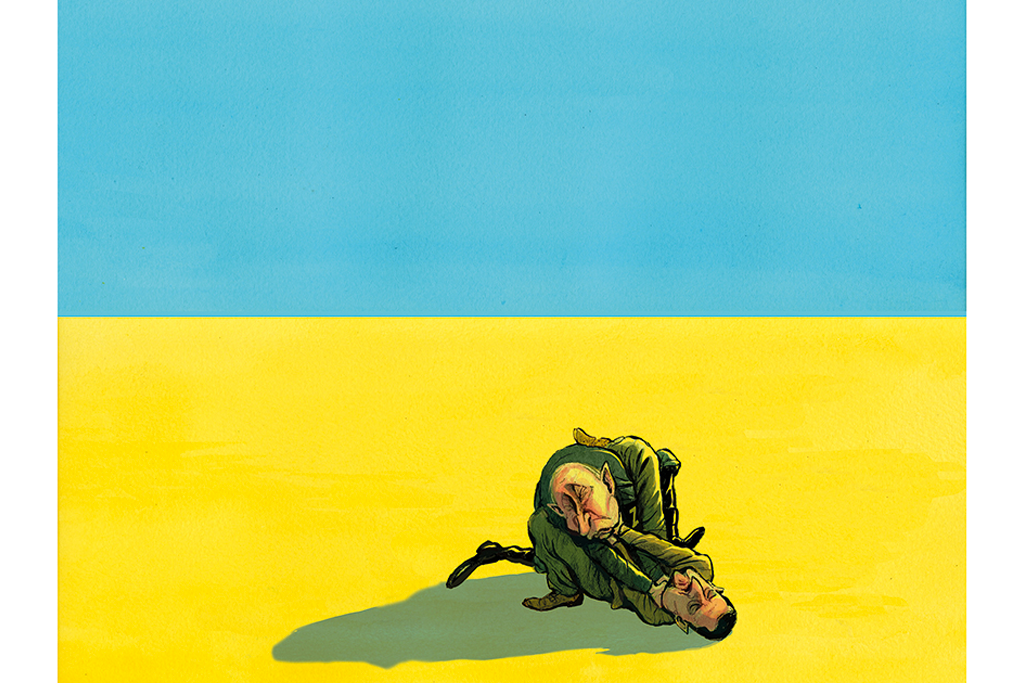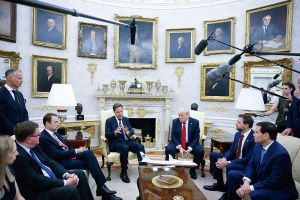As the war in Ukraine enters its second year, today seems as a good time as any to reflect on its first, and see what the future might hold. Six foreign policy experts from across the spectrum of opinion offered their thoughts to The Spectator.
As the war in Ukraine enters its second year, how do you foresee the conflict ending?
Ted Carpenter: There are several possible outcomes, but the most likely is a ceasefire without a formal peace accord. That move would end the bloodshed, but it would leave the underlying disputes unresolved. Such an outcome would be similar to the armistice that ended the Korean War. It also would create the world’s largest and most dangerous “frozen conflict.”
Eliot Cohen: If the West is staunch and supplies Ukraine with what it needs — including long-range weapons — [it ends] with Russian military defeat on the ground, and the recovery of most or all of the territories lost since 2014. If not, an eventual “hot-frozen” conflict, with continued fighting along a nominal ceasefire line. Probably, too, the fall of Vladimir Putin within a year or two.
Elbridge Colby: I’m not sure that we can be confident that the war will definitively end, certainly not any time soon. I’m not very certain of what is to come at all, but I think it’s likely the war will go on and unlikely there will be a dramatic, conclusive victory by one side or the other. One possibility is some kind of a stalemate, characterized possibly by movement and maneuver, but basically with the lines stabilizing at some point. Another is that the conflict goes on in a more desultory way, more or less indefinitely; this would not technically be a frozen conflict because it could be quite hot, but it won’t necessarily be at the same level of intensity. It’s possible that the Ukrainians, certainly hopefully, make dramatic gains in the coming months or so, but General Milley and others have poured cold water on that. It also is possible the Russians make dramatic gains, although Moscow’s limited progress so far with the current offensive suggests that’s not very likely either.
So I think the sort of middle of the spectrum, in terms of probability, is some kind of eventual stalemate or back and forth. I’m not sure there is going to be a formal conclusion of the conflict in the near future. You could see an armistice at some point — I mean, consider the Korean Peninsula, where there has never been a peace treaty, there has been an armistice. Bottom line, though, I don’t have a strong prediction about where exactly things will go, I think it is important to underline that there is a range of possible outcomes. But I think it is likely to be protracted and not have a decisive ending one way or the other.
Joseph S. Nye, Jr.: Every war ends, but how? Russia loses; Ukraine loses; or they compromise. There is no sign of any of these three outcomes now, so the war is likely to drag on until one of them appears.
Michael O’Hanlon: I don’t know. It could go on a long time. My best hope, however, is that some kind of new equilibrium emerges and is recognized as such by both parties by this summer. My hope, naturally, is that the new equilibrium will be favorable to Ukraine — but I don’t expect it to win back all territory by then (or even in 2024, should the war continue). At that point, negotiations may be possible, especially if we can imagine a new security architecture for Europe (separate from NATO) that would protect Ukraine without ostracizing, permanently excluding, or enraging Moscow.
Dalibor Roháč: The only way that this war can end is for Russia to explicitly abandon its war aim of regime change in Kyiv, or of Ukraine’s “denazification” and “demilitarization.” That will require, in turn, that Russia be soundly defeated on the battlefield and Ukraine be restored to its legal, pre-2014 borders. Anything short of that outcome — particularly a frozen conflict scenario or an inconclusive ceasefire — carries with itself the promise of the war’s eventual return as soon as Russia is able to reconstitute its forces.
What are your greatest concerns for the next year in terms of the war in Ukraine?
Carpenter: That this steadily escalating war will culminate in a direct military clash between NATO and Russia. Western policy is becoming alarmingly risk tolerant. The risks now greatly exceed any potential benefits to the United States or its European allies.
Cohen: Western will to pour in the aid that Ukraine needs. It’s a strategic bargain, but too many Western leaders are too timid, too limited in their vision, and too irresolute to do what needs to be done.
Colby: I’m most worried about the fundamental dichotomy between what the United States is saying it’s going to do in terms of supporting Ukraine, and its stated priority of focusing on China, particularly in light of the growing and urgent threat to Taiwan. There is a fundamental ends/means mismatch going on. The president and his administration say we can walk and chew gum at the same time, saying that there is an unwavering commitment to Ukraine, that we will stand with them, but that’s inconsistent with rectifying what is a deteriorating military balance in the western Pacific. Even if the conflict in Ukraine goes in Kiev’s favor, the Russians are not going to just disappear, so they are still going to be a threat. So at some point there has to be a choice in favor of Asia, and I haven’t seen that happening yet. That is very worrying.
Nye: The deaths of too many Ukrainian civilians in a protracted war.
O’Hanlon: That it will just grind on — or that Russia will escalate.
Roháč: The main short term risk is the West’s going wobbly — the Biden administration’s gradual turning off of the spigot of military and non-military assistance, or the prospect of Germany and France trying to strong-arm Kyiv into accepting a Minsk II-like arrangement. An intensification of China’s support to Russia, particularly if it were to provide military assistance, would be a major cause for concern, too.
What has surprised you about the war in these first twelve months — and what is the most notable thing you have learned?
Carpenter: The most surprising development has been Russia’s inability to handle basic military logistics. In fairness, however, NATO has poured advanced weaponry into Ukraine, and the United States and the UK have massively assisted Kyiv’s forces with crucial intelligence data. Without such aid, Russia’s forces would likely have prevailed already despite the military command’s notable deficiencies.
Cohen: Russian military ineptitude. And I have re-learned, or rather had confirmed, the extraordinary power of a nation’s willingness to fight for its freedom and its existence.
Colby: That the Russian military has been much less formidable and the Ukrainians more formidable than I thought. In terms of what we have learned: the war has lent strength to the idea that a large war can be fought under the nuclear shadow. There have been nuclear threats and so forth, largely indirect, but both sides are observing escalatory thresholds quite carefully, and while those are moving and negotiable, it’s not like the world has been blown up. Obviously, that’s a real concern, the potential for nuclear escalation is a very real concern. But fortunately or unfortunately — and it cuts both ways — the war indicates that you can in fact fight a large conventional war under the nuclear shadow.
Nye: Strategically, the cohesion of Western support. Tactically, the minor role of cyber weapons.
O’Hanlon: I have relearned the same lesson that I emphasize in my new book on military history — war is usually much harder than aggressors, and many onlookers, expect when it begins. I have also been very impressed by the Ukrainian people and government.
Roháč: Ukrainians overperformed most reasonable expectations, including my own, on essentially every metric that counts — from military strategy and tactics, through cohesion, quality of political leadership, to their ability to rally international actors to their cause. Conversely, Russia’s military appears to have proven to be hollowed out and ineffective as a fighting force against a nominally inferior adversary.
How concerned are you about escalation between the West — specifically the US — and Russia? Do you think Western politicians have been too cautious, not cautious enough — or are they succeeding in threading the needle?
Carpenter: See my answer to question two. Western, especially US, officials have been far too reckless. They’ve gone from giving Ukraine Javelin anti-tank weapons and small arms during the early stages of the war to now supplying Kyiv with heavy battle tanks. The loose talk about giving Ukraine F-16s is especially worrisome. NATO is dangerously close to crossing a Russian “red line.” The result could be moving from a proxy war against Russia to a direct confrontation with incalculable risks. Western leaders are not just playing with fire; they’re playing with dynamite.
Cohen: To the first question no — there is not much Russia can do that does not make its own situation a lot worse. And yes, Western politicians have been way too cautious. The result is a war that is longer and more costly than it needs to be.
Colby: The concern about escalation is real, and needs to be taken very seriously. The fact that the Russians are mobilizing and throwing more conventional forces into the fight makes me a little less concerned, at least right now, about the potential for nuclear escalation. The downside of that is it means that Putin and the Kremlin apparently think that they can gain that way. But, look, Russia has thousands of nuclear weapons, we have little meaningful defense against them, so we have to take them seriously. That doesn’t mean doing whatever the Russians want, but I don’t think we’ve been doing that. On the level of nuclear escalation, the administration, to its credit, has taken that potential seriously, and paid attention to it without becoming completely intimidated by it.
So the West has threaded the needle pretty well, supporting the Ukrainians with conventional weaponry, but observing the real problem of Russian potential thresholds for nuclear use. My argument for constraint on the provision of weaponry is not so much the escalation issues, although I think we have to take those seriously, but rather the tradeoffs with our primary threat from China in the Pacific.
Nye: Deterrence works in two directions in this game of chicken. Since Putin has higher stakes than Biden, he has rattled the nuclear saber with threats of escalation, but this has not stopped the West gradually increasing its support to Ukraine. I think we could do more.
O’Hanlon: I wrote a column about this in the Washington Post last month. I generally think Biden has done well, but the tank decision was too tortured/delayed, and we need a clearer vision for our future role to guide subsequent decisions over fighter jets, attack helicopters, and longer-range missiles.
Roháč: I am not concerned at all, to put it bluntly. Notwithstanding the rhetorical grandstanding, Putin is not seeking a military conflict with NATO – that would be a conflict he would surely lose. There are good reasons why his aggression is directed at countries such as Georgia, Moldova, or Ukraine, which are all outside of NATO’s security umbrella. As a result, I do believe that Western policymakers, including the US ones, have been too slow and too hesitant to provide Ukraine with all the assistance they need to defend themselves. Most seriously, if we had been more serious about showing our support to Ukraine before the invasion through stronger lethal aid and a credible signaling of consequences to Russia, there might not have been an invasion at all.
What lessons do you think China is taking from the war in Ukraine — and what lessons should Beijing take?
Carpenter: Russia’s military difficulties in Ukraine likely have induced greater caution in Beijing about invading Taiwan — at least in the short term. However, NATO’s economic sanctions on Russia have driven that country into a much closer relationship with the PRC. That development is a significant benefit to Beijing diplomatically, economically, and militarily.
Cohen: Hard to tell, but probably the most important one has to do with the will of the United States to act to counteract an attack on a (relatively) small state by a big one. Plus lots of operational and tactical lessons about the need to get an initial strike right.
Colby: Those are a little bit of the same questions for me, because I don’t pretend to have a clear view into what Beijing is really thinking, so I can only surmise what is the rational inference from what’s happened. In that light, I think the biggest lesson for Beijing is: don’t mess around. If you’re going to go after Taiwan, which I think is very possible, you go in big, you go in fast, you don’t dither, you don’t underestimate it. If you were thinking you were going to capture somebody, you kill him; if you were thinking of sending two missiles, you send six; if you were thinking of leaving an airfield alone, you take that airfield out. I think that is by far the biggest message in the sense that a huge source of the Russian failure was the kind of half-baked, overcomplicated, and undermanned Russian assault at the beginning. And, of course, the Ukrainians exploited that very adeptly.
It’s not the justness of the cause that has really powered support, the material factor is the fact that the Ukrainians have fought so well. But if Taiwan falls quickly, that’s not going to be there, it’s going to be a fait accompli. I think China will draw the conclusion that they shouldn’t be overconfident, and they need to triple check everything. But the notion that they’ve given up the idea of potentially attacking Taiwan is belied by the facts, which are that they continue to prepare in a very focused way!
Nye: If Putin failed in his land invasion of a neighbor, China had better be careful before trying an ambitious amphibious invasion of Taiwan. Keep harassment of the island below the threshold of war.
O’Hanlon: I hope it is relearning the same lesson I emphasized in my answer to question three, plus the reality that the Western world will punish China economically for a very long time if it attacks Taiwan.
Roháč: For Beijing, the main lesson is surely not to get high on one’s own supply. Putin’s invasion has proven a catastrophe not so much because of the brilliance of the West’s response but rather because of his fatal misreading of Ukraine’s capabilities and of Ukrainians’ will to resist — a result of his believing his own propaganda. The lesson for Xi is not so much that he should not invade Taiwan but rather that he should do so competently — or rely on non-military tools to subdue the island nation.
***
Ted Galen Carpenter is a senior fellow in defense and foreign policy at the Cato Institute. He has also been the director of foreign policy studies and vice president for defense and foreign policy studies at Cato. Carpenter is a contributing editor to the National Interest, the American Conservative and 19FortyFive, and is a weekly columnist at Antiwar.com.
Eliot Cohen is the Arleigh A. Burke chair in strategy at the Center for Strategic and International Studies, and the Robert E. Osgood professor at Johns Hopkins School of Advanced International Studies, or SAIS. He was a director in the Defense Department’s policy planning staff, led the US Air Force’s multivolume study of the first Gulf War and was counselor of the Department of State, serving as Secretary Condoleezza Rice’s senior advisor.
Elbridge Colby is co-founder and principal of the Marathon Initiative, and served as the deputy assistant secretary of Defense for Strategy and Force Development from 2017-2018, where he was as the lead official in the development and rollout of the Department’s preeminent strategic planning guidance, the 2018 National Defense Strategy (NDS).
Joseph S. Nye Jr. is University Distinguished Service professor, emeritus and former dean of the Harvard Kennedy School of Government. He has served as assistant secretary of defense for international security affairs, chair of the National Intelligence Council, and deputy undersecretary of state for security assistance, science and technology.
Michael O’Hanlon is a senior fellow and director of research in foreign policy at the Brookings Institution. He directs the Strobe Talbott Center on Security, Strategy and Technology, as well as the Defense Industrial Base working group, is the inaugural holder of the Philip H. Knight chair in defense and strategy, and is an adjunct professor at Columbia, Georgetown and George Washington universities.
Dalibor Roháč is a senior fellow at the American Enterprise Institute, a research associate at the Wilfried Martens Centre for European Studies in Brussels, and a fellow at Anglo-American University in Prague. He was previously affiliated with the Cato Institute’s Center for Global Liberty and Prosperity, the Max Beloff Centre at the University of Buckingham, the Legatum Institute and the Center for the New Europe in Brussels.

























